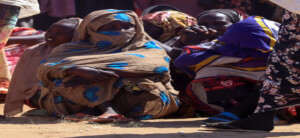Sudan celebrates International Women’s Day
International Women’s Day was celebrated throughout Sudan yesterday. Various events took place and prominent women held speeches.
 Rally of the No To Oppression Against Women Initiative celebrating the 16 Days of Activism Against Gender Violence, December 16, 2019 (RD)
Rally of the No To Oppression Against Women Initiative celebrating the 16 Days of Activism Against Gender Violence, December 16, 2019 (RD)
International Women's Day was celebrated throughout Sudan yesterday. Various events took place and prominent women held speeches.
The Darfur Bar Association (DBA), for example, called on the government to pay attention to displaced women and refugees. Nafeesa Hajar, head of the DBA, demanded the implementation of gender policies that were agreed upon in the Constitutional Document and the Juba Peace Agreement, including the policy that requires 40 per cent representation of women in all levels of Sudan’s government.
Hanadi Fadul, representative of the Sudan Institute for Democracy, called March 8 “a symbol of women's struggles” in her speech at the University of El Gezira yesterday. She said that women played an important role in the revolution and the struggle against the defunct regime. Fadul also explained that women’s day aims to establish a new culture to provide the opportunity for officials to listen to people and activists.
Panel discussion with women’s cooperative societies
Khaled Omar, Minister of Cabinet Affairs, acknowledged the governmental neglect of women's issues and stressed the council’s political will to ratify the Convention on the Elimination of All Forms of Discrimination Against Women (CEDAW).
During a discussion session, which included a number of women representatives from women’s cooperative societies, Omar stated that women's issues are linked to the issues Sudan experiences, especially with regards to peacebuilding, the economic crisis, and legal reform.
The representatives of women’s cooperative societies pointed out the issues and concerns that women face, especially those in peripheral areas. The raised issues included issues of identity documents, education, cases of female workers in farms and factories, gender-based violence (GBV), and the lack of legal protection.
They also talked about problems faced by women university students living in conflict zones and the sexual and physical abuse, harassment, and academic exploitation they frequently face. The representatives demanded equal opportunities for girls in vocational training to increase their opportunities.
The representatives also asked why the conventions supporting the rights of women had not been ratified or signed to ensure non-discrimination in line with the Constitutional Document.
New Minister of Social Development
The new Minister of Social Development, JEM Vice-President Ahmed Bakheet, pointed out the prominent role of women in the glorious December Revolution and the need to empower them by allowing access to advanced positions. He also affirmed the transitional government's determination to get women out of prisons.
Bakheet said that the government aims to support women inmates and transform them into “businesswomen” in cooperation with the General Administration of Prisons and women workers. He also stressed the need to enact laws that preserve the dignity of women prisoners and acknowledged that their employment is often unfair in terms of wages and benefits.
He further said that there is a need to establish women's committees for issues concerning human rights and land access, based on the slogans of the revolution. He also called for the drafting of a personal status law “that honours women and preserves the family”.
Last week, Bakheet met with the ambassador of Sweden to Sudan to discuss cooperation in priority areas, such as gender equality and women’s empowerment.
Women in Sudan
While Sudanese women continue to be disproportionately affected by violence in its various forms in the country, they have also been at the forefront of the revolution, demanding justice and peace.
News outlets estimated that about 70 per cent of the protesters during the 2018 December Revolution against the regime of Al Bashir were women, making them visible leaders on the frontlines of the revolution.
Since the fall of the former regime, the death penalty for apostasy has been repealed. Female Genital-Mutilation (FGM) has been outlawed and the execution of children has been banned. Women no longer need the consent of their husband or male guardian to travel with their children.
The Constitutional Document of August 2019 guarantees 40 per cent representation to women in the 300-seat Legislative Council, still to be formed. The new quota is an increase from the previous representation quota of 25 per cent, which was set during the former regime.
Yet, Sudanese women remain on the sidelines. Only 12 per cent of the Juba Peace Agreement table included women. Women’s rights groups in Darfur and Khartoum continue to call for a broader representation in the new transitional government and in all aspects of Sudanese life.
For Women’s Day, Radio Dabanga published a special article on media for women in Sudan and monitored its own media content and audiences with a specific focus on women’s representation.











 and then
and then